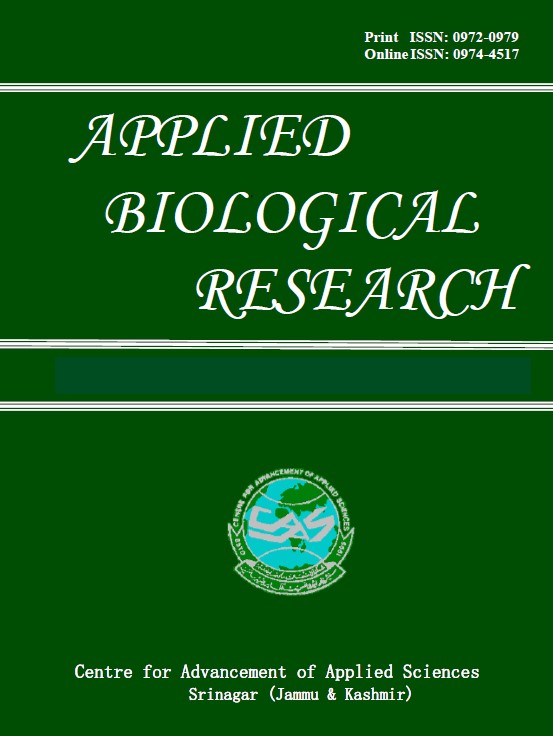Characterization Of Wheat Genotypes Using Morpho Physiological Traits For Heat Tolerance
DOI:
https://doi.org/10.48165/Keywords:
Characterization, wheat genotype, morpho-physiological traits, heat tolerance, grain yieldAbstract
Constant or transitory high temperatures affect plant growth and development inducing diverse morphological and physiological changes in plants which ultimately causes yield decrease. The traits like relative injury (RI%), chlorophyll content, canopy temperature depression (CTD), heat susceptibility index (HSI), 1000-kernel weight (TKW), grain filling duration (GFD) were used in present study to assess the capability of plants to tolerate heat stress. The study revealed that the evaluated wheat genotypes showed variable degree of tolerance against heat fordifferent traits. On the basis of morpho-physiological traits such as RI, chlorophyll content at 15 days after anthesis (DAA), CTD at 15 DAA, HSI, TKW, GFD, genotypes HD2329 x HD2967 (19.2%), WH1021 (-21.7%), JOB666 X WH1105 (-37.5%), WH1124 X HD2967 (0.55), HD2891 (2.1%) and WAXWING X HD2967 (-2.15%) were identified as the most heat tolerant genotypes for respective characters. For grain yield out of 54 wheat genotypes, DBW90, HD2329, UP2843 × HD2967, WH1124 × HD3059, WH1124 × HD2967, MACS6272 × WH1105, MACS6272 × HD2967, HD2891 × WH1105 and UP2338 were classified as heat tolerant.
Downloads
References
Al-Khatib, K. and Paulsen, G.M. 1984. Mode of high temperature injury to wheat during grain development and its heritability. Euphytica, 104: 1-8.
Almeselmani, M. and Deshmukh, P.S. 2012. Effect of high temperature stress on physiological and yield parameters of some wheat genotypes recommended for irrigated and rainfed condition. Jordan Journal of Agricultural Science, 8: 66-78.
Bahar, B., Yildirim, Y. and Yucel, C. 2011. Heat and drought resistance criteria in spring bread wheat (Triticum aestivum L.): Morpho-physiological parameters for heat tolerance. Science Research and Essays, 6: 2212-2220.
Bala, S., Asthir, B. and Bains, N.S. 2014. Effect of terminal heat stress on yield and yield attributes of wheat. Indian Journal Applied Research, 4(6): 1-2.
Blum, A. and Ebercon, A. 1981. Cell membrane stability as a measure of drought and heat tolerance in wheat. Crop Science Journal, 21: 43-47.
Cao, X., Mondal, S., Cheng, D., Wang, C., Liu, A., Song, J., Liu, J. 2015. Evaluation of agronomic and physiological traits associated with high temperature stress tolerance in the winter wheat cultivars. Acta Physiologiae Plantarum, 37(4): 90-92.
Dhanda, S.S. and Munjal, R. 2006. Inheritance of cellular thermo tolerance in bread wheat. Plant Breeding, 125: 557-567.
Dhyani, K., Ansari, M.W., Rao, Y.R., Verma, R.S., Shukla, A. and Tuteja, N. 2013. Comparative physiological response of wheat genotypes under terminal heat stress. Plant Signaling and Behavior, 8(6): 245-264.
Dias, A.S. and Lidon, F.C. 2009. Evaluation of grain filling rate and duration in bread and durum wheat, under heat stress after anthesis. Journal of Agronomy and Crop Science, 195: 137-147. Farooq, M., Bramley, H., Palta, J.A. and Siddique, K.H.M. 2011. Heat stress in wheat during
reproductive and grain filling phases. Critical Reviews in Plant Science, 30: 1-17. Fischer, R.A. and Maurer, R. 1978. Drought resistance in spring wheat cultivars: 1. Grain-yield responses. Australian Journal Agricultural Research, 29: 897-912.
Fokar, M., Nguyen, H.T. and Blum, A. 1998. Heat tolerance in spring wheat. II. Grain filling. Euphytica, 104: 9-15.
Gutierrez, M., Reynolds, M.P., Raun, W.R., Stone, M.L., Klatt, A.R. 2010. Spectral water indices for assessing yield in elite bread wheat genotypes under well-irrigated, water-stressed and high-temperature conditions. Crop Science, 50: 197-214.
Amarjeet Kumar et al.
Joshi, A.K., Mishra, B., Chatrath, R., Ferrara, G.O. and Singh, R.P. 2007. Wheat improvement in India: Present status, emerging challenges and future prospects. Euphytica, 157: 431-446. Kumar, A., Harshwardhan, Kumar, A. and Prasad, B. 2015a. Heterotic performance of diallel F1 crosses over parents for yield and its contributing traits in bread wheat (Triticum aestivum L.). Journal of Hill Agriculture, 6: 58-61.
Kumar, A., Harshwardhan, Kumar, A. and Prasad, B. 2015d. Combining ability and gene interaction study for yield, its attributing traits and quality in common wheat. Journal of Applied and Natural Science, 7: 927-934.
Kumar, A., Prasad, B. and Kumar, A. 2015b. Study of variance components of combining ability for yield, its attributing traits in common bread wheat. Elixir Agriculture; 81: 31425-31426. Kumar,A., Harshwardhan, Kumar, A. and Prasad, B. 2015c. Estimation of correlation coefficient for yield and quality parameters of bread wheat under Tarai region of Pantnagar. Annals of Plant and Soil Research, 17(special issue): 224-228.
Kushwaha, S.R., Deshmukh, P.S., Sairam, R.K. and Singh, M.K. 2011. Effect of high temperature stress on growth, biomass and yield of wheat genotypes. Indian Journal of Plant Physiology, 1: 93-97.
Lobell, D.B., Sibley, A. and Ortiz-Monasterio, J.I. 2012. Extreme heat effects on wheat senescence in India. Nature Climate Change, 2: 186-189.
Mohammadi, M. 2012. Effects of kernel weight and source-limitation on wheat grain yield under heat stress. African Journal of Biotechnology, 11: 2931-2937.
Munjal, R. and Dhanda, S.S. 2004. Associations for heat tolerance in bread wheat. National Journal of Plant Improvement, 6: 71-73.
Nour, A., Nadya, A.R., Hayam, S.A., El-fateh and Mostafa, A.K. 2011. Line x tester analysis for yield and its traits in bread wheat. Egyptian Journal of Agricultural Research, 89: 979-992. Prasad, B., Bahuguna, A., Shukla, D.K. 2012. Genotypic variation studies of perilla (Perilla frutescens L.) germplasm under North-West Himalayan agri-silvi system. Environment and Ecology, 30: 1235-1237.
Rane, J., Pannu, R.K., Sohu, V.S., Saini, R.S., Mishra, B., Shoran, J., Crossa, J., Vargas, M. and Joshi, A.K. 2007. Performance of yield and stability of advanced wheat genotypes under heat stress environments of Indo-Gangetic plains. Crop Science, 47: 1561-1573.
Reddy, S.R., Chhabra, A.K., Behl, R.K. and Reddy, N.P.E. 2008. Membrane thermostability test as an indication of heat tolerance in wheat (Triticum aestivum L.). Journal of Research, 36(4): 54-56.
Reynolds, M.P. and Borlaug N.E. 2006. International collaborative wheat improvement: Impacts and future prospects. Journal of Agricultural Sciences, 144: 3-17.
SAS. 2003. The SAS system for windows, 9.1 SAS Institute, Cary, NC., USA. Shefazadeh, M.K., Mohammadi, M. and Karimizadeh, R. 2012. Genotypic difference for heat tolerance traits under real field conditions. Journal of Food Agricultural and Environment, 10: 484-487.

